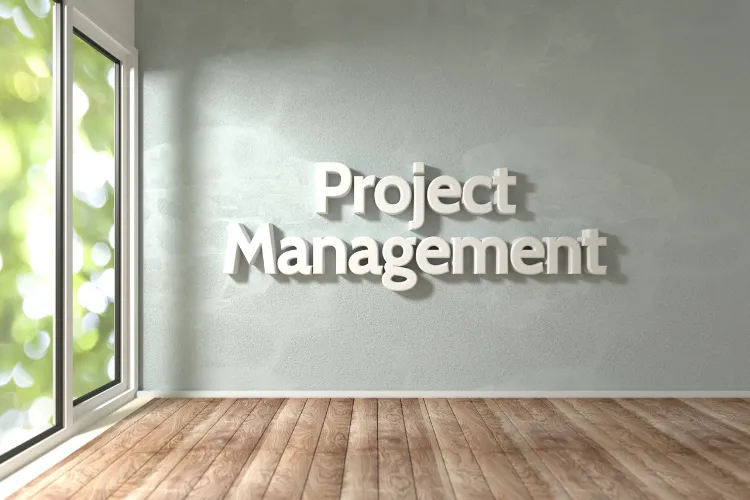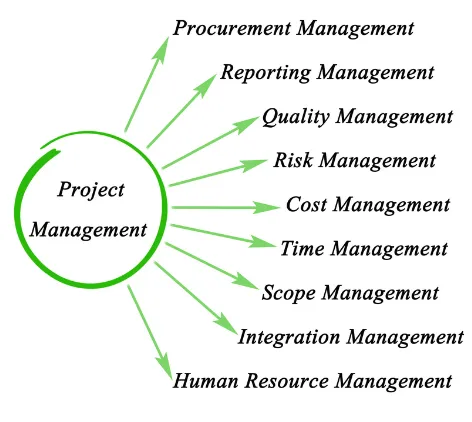When it comes to your career, you don’t want to just cruise along. You want to be moving forward, constantly growing and learning new things. But sometimes, it can be hard to know where to start. If you’re interested in a career in project management, this guide is for you. We’ll give you an overview of the seven steps you need to take to launch your project management career. Each step is essential, and there’s no one right way to complete them all. So don’t worry if you’re unsure what to do next.
Just take a deep breath and start with step one.
Contents
What is Project Management as a Career Path?

What is Project Management? In a nutshell, it is the process of planning, executing, and monitoring projects. A career in project management can be both rewarding and challenging. It is a great option for those who are interested in both business and technology.
There are many different aspects to project management, from budgeting and scheduling to risk management and quality control. As a result, a successful project manager must be able to wear many different hats. If you are organized, detail-oriented, and good at problem-solving, then a career in project management may be right for you.
What is Project Management Career Path?
The term “project management” encompasses a wide range of responsibilities, from overseeing construction projects to coordinating large-scale corporate initiatives. Successful project managers are able to effectively juggle multiple tasks and stakeholders while always keeping the end goal for your project team in mind.
There are many different types of project manager positions available, so no matter what your interests or skill set, there is likely a role that is a good fit for you. And Regardless of which career path you choose, you will need to have strong communication, organizational, and project management skills.
With the right training and experience, a career in project management can be both personally and professionally fulfilling.
Who are Project Managers?

In business, the term “project manager” is thrown around a lot. But what does a project manager actually do?
In short, a project manager is responsible for ensuring that an entire project is completed by your project team members on time, within budget, and to the required standards. To do this, they must plan and coordinate all aspects of the project, as well as monitor progress and performance against the original plan.
There are many different roles that a project manager may take on, depending on the size and scope of the project. For small projects, the senior project manager may be responsible for all aspects of the project from start to finish. For larger projects, they may focus on specific areas such as risk management or quality control. In all cases, however, the project manager must have a good understanding of the project management life cycle and triple constraints in order to coordinate all activities effectively.
While it is impossible to list all of the roles and responsibilities of a project manager here, some of the most common tasks include:
- Defining project scope and objectives
- Creating project schedules and timelines
- Identifying and managing risks
- Allocating resources
- Monitoring progress and performance against the original project plan
- Communicating with stakeholders
If you are ever tasked with leading a project, remember that a successful outcome depends on your ability to effectively manage all aspects of the project from start to finish.
Types of Project Managers:
Project managers come in all shapes and sizes. No two project managers are alike, and each brings their own unique set of skills and experiences to the table.

Here are a few of the most common slang of project managers:
- The first type of project manager is the classic “command and control” manager. This type of manager is known for being highly organized and detail-oriented. They tend to be very hands-on, and they have a clear vision of how the project should be managed.
- The second type of project manager is the more relaxed “laissez-faire” manager. This type of manager is known for being more flexible and easy-going. They tend to let their team members take more ownership of the project, and they’re not as concerned with micromanaging every detail.
- The third type of project manager is the “hands-off” manager. This type of manager is known for being more strategic and less involved in the day-to-day management of the project. They often work closely with upper management to make sure the project is on track, but they don’t get too involved in the details.
Then here are some technical project managers terms we use nowadays:
- The most common type is the “traditional project manager,” who is responsible for overseeing all aspects of the project from start to finish. They are typically very organized and detail-oriented and have a strong sense of what needs to be done to complete the project successfully. However, they can also be inflexible and resistant to change, which can make it difficult to adapt to unforeseen circumstances.
- Another common type of project manager is the “agile project manager,” who is focused on making small, incremental changes to the project as it progresses. This approach allows for more flexibility and creativity but can also be more chaotic and unpredictable. As a result, agile project managers need to be very good at multitasking and handling ambiguity.
- Finally, there is the “hybrid project manager,” who combines elements of both traditional and agile approaches. This type of manager is often best suited for large or complex projects that require a high degree of coordination between different teams. Hybrid project managers need to be highly adaptable and able to switch between different styles as the situation warrants.
No matter what type of project manager you are, there’s one thing that all project managers need to be successful: a clear understanding of the project management process.
The Typical Project Manager Career Path
For anyone considering a career in project management, it’s important to know what the typical project manager career path looks like.
In “most” cases, it starts with a bachelor’s degree in a relevant field, such as business administration or engineering. From there, many aspiring project managers complete a master’s degree or certification in project management. However, some employers may be willing to hire candidates with significant experience in a related field, such as construction or software development.
Once you’ve landed a job, the next step is to gain experience and knowledge in the specific industry you’ll be working in. For example, if you want to become a healthcare project manager, it will be helpful to have experience working in the healthcare industry.
As you gain experience and build your skill set, you can move up the ladder to more senior positions. You may have to start your career with entry-level positions, such as project coordinator, junior project manager or assistant project manager position. Through hard work and dedication, you can move up to senior positions, such as project manager or program manager. From there, the sky is the limit! With the right combination of experience and education, senior project managers can advance to executive-level positions, such as chief operating officer or even CEO.
Some project managers may even choose to start their own consulting firms. The typical career path of a project manager can be long and winding, it is typically very rewarding. Those who are successful in this field often find that they have a great deal of satisfaction in helping to bring projects to successful completion.
The project management field is full of opportunities for those who are willing to put in the hard work. With a clear understanding of the typical career path, you can set your sights on where you want to be and start planning your route to get there.
What skills are required for a Project Manager’s Career path?

A senior project manager is responsible for the successful execution of a project from start to finish. Managers must possess a unique combination of technical skills and knowledge in order to successfully navigate the project management life cycle.
The PMLC consists of initiation, planning, execution, monitoring & controlling, and closing. Each stage of this lifecycle requires different skills and knowledge in order to be successful. For example, during the initiation stage, PMs must be able to clearly communicate the project’s goals and objectives to all key stakeholders. They must also be able to identify any potential risks that could threaten the success of the project. During the execution stage, Project Managers must be able to motivate and manage team members in order to keep them on task. They must also be able to quickly resolve any conflicts that may arise.
Project Managers must also be aware of the triple constraints of projects: scope, time, and cost. Balancing these three constraints is essential for successfully completing a project on time and within budget. Project managers who can effectively navigate the PMLC and master the skills required for each stage are highly sought-after by employers.
Once you have a firm grasp of the basic PMLC and Triple Constraints, you can begin to build up your skill set and knowledge base. With hard work and dedication, you can advance to senior-level positions and even start your own consulting firm!
Project Management Education

Now that we’ve gone over the basics of what a great project manager does and what skills are necessary for success, let’s take a closer look at education. As we mentioned earlier, in order to become a project manager, you will need at least a bachelor’s degree in a relevant field. Many project managers also choose to complete a master’s degree or certification in project management.
There are many different educational paths you can take in order to become a great project manager. For example, you could study business administration, engineering, or even architecture. If you’re interested in obtaining a master’s degree, there are many options available, such as an MBA with a concentration in project management or a Master of Science in Project Management.
There are many different aspects to project management, and it can be difficult to keep track of everything without proper training. That’s why obtaining a project management education is so important. By getting an education, you will be able to learn about all the different aspects of the project management world and how to properly handle them. In addition, education will also help you obtain certifications that are necessary for many project management positions. Therefore, if you want to be a successful project manager, make sure to get a good education. It will definitely pay off in the long run.
Project Management Certifications
Don’t you hate it when people try to impress you by name-dropping their credentials?

“Oh, you didn’t know I have a Ph.D. in quantum mechanics? I got my degree from Harvard.” Or,
“I’m a member of the National Organization of Certified Public Accountants. I just got my certification last week.”
OK, now I’m impressed. Certifications are important.
Project management certification can help you to improve your skills and abilities in the field. By completing a certification program, you can learn the latest techniques and best practices in order to manage and execute projects. In addition, certification can also give you a competitive edge when applying for jobs or promotions. They let employees know that the person has met certain standards and has the knowledge to do a job well.
But there are so many different certifications out there. How do you know which ones are worth your time and money?
For project managers, there are a few different certifications that are well respected in the industry. The Project Management Institute (PMI) offers the Project Management Professional (PMP) certification. To be eligible for the PMP, you must have 4,500 hours of experience leading and directing multiple projects, as well as 35 hours of project management education. You also must pass an exam. The PMP is one of the most recognized certifications in the world and is highly respected by employers.
Then PMI also offers Certified Associate in Project Management (CAPM) which is designed for those who are just beginning their project management careers. The requirements for the CAPM are less stringent than the PMP, but it is still a valuable certification to have.
Other certifications that are well respected in the industry include the Certified ScrumMaster (CSM) from ScurmAlliance, Agile Certified Practitioner (ACP) from PMI, and PRINCE² Foundation from AXELOS.
All of these certifications will help you to improve your skills as a project manager. However, keep in mind that you don’t need to have all of these certifications to be successful. In fact, many employers place more emphasis on experience than they do on certification. Therefore, don’t let the pursuit of certification hold you back from starting your project management career. Just pick one or two that are most relevant to the type of projects you want to manage and go for it!
There is no one right path to becoming a project manager. You can get started with just a few years of experience in an industry, or you could get a master’s degree. The important thing is to keep learning and advancing your skills so that you can be the best project manager you can be!
Ways of Managing Multiple Projects or Product Development as a Project Manager

As a project manager, you wear many hats.
You’re responsible for the big picture and the small details. You have to juggle schedules and deadlines and make sure everyone is on the same page. It can be a lot to handle, but fortunately, there are some tried and true methods of managing projects effectively. Whether you’re developing a new product or overseeing a large construction project, these tips will help you keep everything on track.
- One of the most important things you can do as a project manager is to set clear goals and objectives. When everyone knows what the end goal is, it’s easier to stay focused and on track. It’s also important to develop a detailed plan of how you’re going to achieve those goals. This will give you a roadmap to follow and help you anticipate any potential problems along the way.
- Another crucial part of effective project management is communication. You need to be able to clearly communicate your vision to your team and make sure they understand their roles in achieving the goals. It’s also important to keep lines of communication open so that you can quickly address any issues that come up.
- Finally, it’s important to have a system in place for tracking progress and measuring success. This will help you identify any areas that need improvement and make sure everyone is aware of the project’s status.
As a project manager, you always have to be looking for new and innovative ways to streamline projects or product development. By following these tips, you can be confident that your project will be a success!
Successful project management requires a mix of strong organizational skills, effective communication, tools and creative problem-solving.
- Managing in current times where things are mostly hybrid or remote, you need to choose the right project management software tool. This way of management allows you to track all aspects of the project or product development, and it will also provide you with a range of tools to help you manage the project or product development.
- Another way of managing projects is by using a project management methodology. This is a more formal approach to project management, and it involves using a set of defined processes and project management tools to manage the project or product development. There are many different project management methodologies available, and you need to choose the one that best suits your project or product.
Yet, you can also use a combination of both approaches to managing your projects or products. By using a combination of both approaches, you can benefit from the strengths of both methods and create a more customized approach to project management that best suits your needs.
It is important to be adaptable and flexible when managing projects, as no two projects, are ever the same. By taking the time to understand the specific needs of each project, and by working closely with all team members, it is possible to develop an effective plan that will help ensure the successful completion of the project.
Your 7 Step Launch Plan for Project Management Career Path
Now that you have decided to pursue a career in project management, it is time to develop a launch plan. This plan will help you get started on the right foot and set you up for success.
1. Choose Your Industry
The first step is to choose the industry you would like to work in. There are many different industries that use project managers, so it is important to select one that interests you. Some of the most popular industries for project managers include construction, IT, and healthcare.
2. Gain experience
The second and obvious step is to gain experience.
You can do this by working on small projects or volunteering for larger ones. If you have the opportunity, shadow a project manager to learn more about what the job entails. As you gain experience, you’ll start to develop the skills and knowledge necessary to be successful in this field.
3. Get Certified
The third step is to get certified.
While not required, certification can show potential employers that you’re serious about your career and that you have the skills needed to be successful. There are many different certifications available, so read above and do some research to find the one that best fits your needs.
4. Create a Portfolio
The fourth step is to create a portfolio. <- Don’t skip this one.
This will be a collection of your work as a project manager, and it will help you demonstrate your skills and experience to potential employers. Be sure to include both successful and unsuccessful projects in your portfolio, as this will show that you’re able to learn from your mistakes.
Creating a portfolio is a great way to showcase your skills and experience as a project manager. By including both successful and unsuccessful projects, you’ll be able to demonstrate that you’re able to learn from your mistakes. You don’t have to stress this step, you can easily create a portfolio by using an online platform like WordPress or Wix.
Creating a portfolio is a great way to showcase your skills and experience as a project manager. You don’t have to stress this step, you can easily create a portfolio on Linkedin and if you want to go an extra step, you can use online platforms like WordPress or Wix.
Once you have created your portfolio, be sure to update it regularly. This will show potential employers that you’re keeping up with the latest trends and that you’re always looking for ways to improve your skills.
5. Develop a Network
The fifth step is to develop a strong network.
This can be done by attending industry events, joining skilled organizations, or simply connecting with other project management professionals online. By developing a strong network, you’ll be able to stay up-to-date on industry trends and connect with potential employers.
A strong network is essential for any project manager. By staying up-to-date on industry trends and connecting with potential employers, you’ll be in a better position to land the project management jobs you desire.
6. Read or Listen to Industry News
The sixth step here is to read industry news.
This can be done by subscribing to industry publications like technicali.com, following project management blogs, or listening to podcasts. By staying up-to-date on industry news, you’ll be better prepared to manage your projects effectively.
Reading industry news is a great way to stay up-to-date on trends and developments in the world of project management.
Listening to podcasts is also a great way to learn more about project management. Some of our favourites include The Project Management Podcast and PM for Masses.
7. Never Stop Learning
The seventh and final step is to never stop learning if you want to be an effective project manager.
The project management field is constantly changing, so it’s important to stay up-to-date on new trends and developments. You can do this by taking classes, reading books, or attending conferences. As a project manager, it’s important to continuously learn and grow in your career.
By continuing your education, you’ll be able to set yourself apart from other project managers and demonstrate your commitment to the profession.
Bonus Step 8: Find a Mentor or Senior Project Manager
Well! This was not included when I originally started to write, but I decided to as it personally helped me grow. So the bonus step that I would recommend is to find a mentor, ASAP.
A mentor is someone who can guide you through your career, bounce ideas off of, offer advice, and help you navigate the challenges you’ll face along the way.
Your mentor doesn’t have to be someone famous or well-connected, it can simply be someone who’s been in the industry for a while and is willing to help you out.
With a mentor a message away, you’ll be better prepared to face the challenges of your project management career.
They can provide invaluable guidance and support as you embark on your project management journey.
The Bottom Line

There you have it! These are the seven steps + bonus one that I recommend you take when launching your project management career path.
Writing this guide took me a long time, I hope this guide was helpful in getting you started on your project management journey.
If you have any questions or suggestions, please feel free to leave a comment below or tweet me.
And if you found this guide helpful, please retweet and share it with your friends and colleagues!


